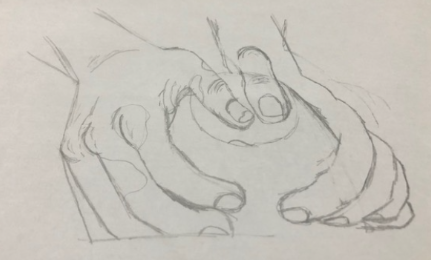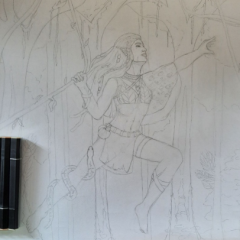Art in the curriculum
The Arts are in trouble! Again….. Ever since the Bonfire of the Vanities in Florence in 1497, Art has been an easy target for those who want life to be less comfortable and enjoyable, and definitely by those who don’t like progress!
Although todays headlines are focussing on University education, an ongoing reduction in the funding for arts in the curriculum has led to significant problems for young artists trying to expand their talents in school.
People have noticed - especially those at the front line of this attack on the arts, the young artists in school.
Unit 1D of the Gold Award asks young people to ‘choose and explore an arts issue of interest or relevance to them’.
At AAI we find that the best presentations for Unit 1D are those based on issues the young people have first-hand experience of, and the issue of a lack of funding for the arts in the curriculum is a constantly re-occurring issue of discussion.
We currently have several young people researching this issue for their Arts Award, and this reflects the frustration and problems young artists encounter today.
Please can I introduce you to two young people currently looking at this issue as part of their Gold Arts Award, Erin from Exeter and Grace from Stanley.
Before the young people start to research for Unit 1D, a good Adviser should always find out what they know already, and try to guide their research towards expanding their understanding.
Erin had first-hand experience of restrictions in their arts education at school, caused by lack of funding for the arts.
Before they started to research this issue we asked them to tell us about their experiences, Erin’s answer neatly encapsulated their perceived problems of lack of equipment and teachers:
‘the art department did not provide the correct equipment needed and so each individual student would have to work with what they had. For example, with substandard paints and pencils.…
They had to use poor-quality art supplies and often didn’t do as well or became frustrated so that they didn’t want to proceed with art.
Additionally, the whole school only had a single art teacher which limited the number of art lessons per week.’
This issue was of importance to Erin because they have amazing talents in a variety of art forms and they are dedicated to developing their talents. They recognized the importance of art in the world, without it ‘we may find ourselves living in a grey concrete boring world’. However, they found they could not realistically pursue their talents in school.
Unit 1D then asks that the young people ‘develop their understanding of an issue affecting the arts and form their own view based on their research and experience’.
So, once we have established the young people’s understanding of their issue, we encourage them to research the subject.
Erin tried to expand her understanding of the reasons behind the apparent reduction in funding. They discovered the ‘build back better’ plan, this is their analysis of this programme:
‘I looked at why governments might be leaning more towards maths and science in favour of subjects related to art, which includes music drama, art and design, textiles etc. One article in open access government (2021) describes the Government cutting funding to art in schools from ‘’36 million per year to 19 million’’, this is staggering, however the department of education argues that we need a “build back better” plan to enable our workforce in areas like healthcare and IT to be better.’
They discovered that there is a lot of positive spin online about the increase in funding for academic subjects, such as maths and the sciences, in education, and I think we can all agree that these are subjects that are useful and necessary in a modern workforce. However, this increase in funding has to come from somewhere, and it is the Arts budgets that are suffering.
However, the Arts are important too, without them, we will produce a generation of creatively challenged individuals - and technology and industry need creative people to drive them forward.
Grace discovered that too many people agreed with her opinion that the Arts were being underfunded in education, they undertook a lot of research to discover the rationale behind the funding issue, but their problems started when they tried to find anyone who would agree that Arts funding needs to be reduced.
Grace was quite alarmed at the facts they uncovered whilst researching this subject; she could find no learned articles which claim that the Arts should be reduced:
‘I did a lot of research on this subject, most of the information I found agreed with my viewpoint and it was difficult to find a viewpoint that disagreed with my viewpoint.’
They also discovered:
‘An article titled "How the arts are being squeezed out of schools” in Forbes in 2019 (accessed 23/5/23) stated that the arts are being forced out of school due to a focus on a “narrowing range of core subjects” as well as noticing that there is a fall in the number of teachers in arts subjects.
Art and design is down by 4%, drama by 6.3% and music by 8.5%.
They also mentioned that school budgets are facing an “unprecedented squeeze” which in turn means that there is no money to invest in the arts subjects.
Less pupils are taking arts subjects at GCSE level, for example in performing and expressive arts subjects pupils entered for the exam were down by 57%.’
Grace concluded:
‘The key message from the government is loud and clear. It is these subjects they deem valuable and worth investment. Schools focus on these subjects’ ensuring targets are met and push more pupils to make those passing grades.’
Following research, the young person then creates a presentation that is based on their experience and on the results of their research into their issue of choice. The Adviser’s role at this stage is to encourage them to present a useful discussion of their issue. Grace and Erin have created excellent presentations on this issue, and their work fully illustrates the problem.
Below we attach both Grace’s and Erin’s full presentation, do you agree with them – are the Arts in trouble?
Erin’s presentation for Unit 1D Gold Arts Award:
Grace’s presentation for Unit 1D Gold Arts Award:
Gold Arts Award Presentation https://www.facebook.com/groups/549437855435698/








Well done Erin and Grace, very interesting work 👏